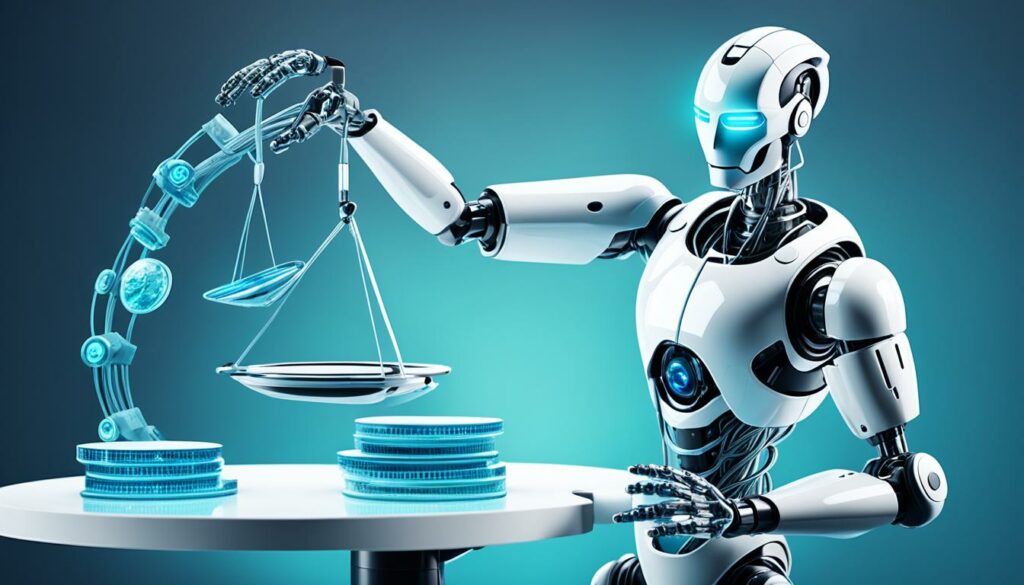
Exploring the Promise of Future Facing Generative AI
Artificial Intelligence (AI) continues to push boundaries and reshape the world we live in. One of the most exciting advancements in this field is future-facing generative AI, which combines cutting-edge AI technology, machine learning innovation, and advanced deep learning capabilities. With its next-generation AI capabilities and the latest neural network models, generative AI is revolutionizing the way we think about creativity and problem-solving across various industries.
Generative AI utilizes advanced deep learning technology, such as the GPT-4 model and generative adversarial networks (GANs), to generate realistic images, videos, and even human-like content. This innovation has incredible potential and is paving the way for a new era of AI solutions. By harnessing the power of generative AI, businesses and individuals can unlock unprecedented creative possibilities and leverage its applications in real-world scenarios.
To provide a deeper understanding of this transformative technology, this article will explore the emergence of generative AI, its controversies, and its impact on culture and society. By delving into these topics, we can gain valuable insights into the future of AI and the responsible development of this powerful tool.
Key Takeaways:
- Generative AI combines cutting-edge artificial intelligence, machine learning innovation, and advanced deep learning technology.
- It has next-generation AI capabilities and utilizes the latest neural network models like GPT-4 and generative adversarial networks (GANs).
- Generative AI is revolutionizing creativity and problem-solving across various industries.
- Controversies surrounding generative AI include the quality of generated content and ethical concerns.
- Generative AI has a broad impact on culture and society, influencing sectors like education, healthcare, and arts and culture.
The Emergence of Generative AI
Generative AI has revolutionized the field of artificial intelligence, introducing cutting-edge technology that is transforming various industries. At the heart of this innovation are advanced language models like GPT-4, which have been trained on massive amounts of data to generate human-like responses and creative content. These language models have paved the way for the development of generative AI, fueling its emergence as a game-changing technology.
The key to the success of generative AI lies in the transformer model, a neural network architecture that empowers these language models. Unlike traditional expert systems that rely on predetermined rules, generative AI is probabilistic in nature. It can handle uncertainty and ambiguity, making it highly versatile and adaptable in various scenarios.
The training methodology of generative AI models involves unsupervised learning, enabling them to learn from any text and produce diverse and accurate content. This approach allows generative AI to continually expand its capabilities and generate innovative solutions.
Generative AI represents a significant shift in the field of artificial intelligence. Its probabilistic nature, empowered by advanced language models and the transformer model, sets it apart from traditional AI approaches. With its ability to generate human-like responses and creative content, generative AI has endless possibilities and is poised to revolutionize the way we interact with technology.
“Generative AI, driven by advanced language models and the transformer model, is paving the way for a new era of artificial intelligence.”
Furthermore, generative AI has the potential to transform industries such as healthcare, education, and the arts. Its impact extends beyond traditional boundaries, opening up new avenues for innovation and creativity. With the right ethical considerations and responsible use, generative AI can be a powerful tool for societal benefit, driving progress and making a positive impact on culture and society.
Generative AI Training Methodologies
Generative AI models utilize unsupervised learning to acquire knowledge from vast amounts of text data. This training methodology allows models to learn patterns and characteristics of language, enabling them to generate accurate and varied content. By learning from different sources, generative AI models can produce creative and contextually relevant output.
Unlike traditional rule-based expert systems, which rely on predetermined rules, generative AI models can handle uncertainty and make probabilistic decisions. This makes them more adaptable and capable of handling complex real-world scenarios.
The training process involves exposing the models to a vast corpus of text data, allowing them to learn patterns, analyze context, and generate responses. By leveraging the power of language models and transformer architectures, generative AI models are able to generate human-like content with remarkable accuracy.
With their unsupervised learning approach and advanced training methodologies, generative AI models have the ability to generate diverse and accurate content. This makes them invaluable in various applications, from natural language processing to content creation and beyond.
A Comparison of Generative AI and Expert Systems
| Generative AI | Expert Systems |
|---|---|
| Probabilistic in nature | Rule-based |
| Handles uncertainty and ambiguity | Relies on predetermined rules |
| Uses language models and the transformer model | Uses predefined rules and logic |
| Trained on vast amounts of text data | Requires manual programming and rule creation |
| Can generate diverse and contextually relevant content | Output is limited to predefined rules |
Generative AI, with its probabilistic nature and advanced training methodologies, offers a new paradigm in artificial intelligence. By leveraging the power of language models and the transformer model, generative AI opens up endless possibilities for creative content generation and problem-solving. It is evident that generative AI has emerged as a transformative technology in the field of artificial intelligence, with far-reaching implications and exciting potential.
The Controversies Surrounding Generative AI
While generative AI has opened up new possibilities, it is not without controversies and ethical concerns. One major concern is the quality of the generated content. Although generative AI models excel at mimicking human language, there are instances where they may produce nonsensical or misleading information. This raises questions about the trustworthiness and reliability of AI-generated content.
Furthermore, the impact of generative AI on culture and society is a topic of debate. The deployment of AI in various fields challenges traditional notions of authorship, raises ethical dilemmas regarding ownership and accountability, and blurs the line between human and AI interaction. These controversies highlight the need for ethical considerations and responsible use of generative AI technology.
Generative AI has the potential to revolutionize creative industries by generating content that is indistinguishable from that created by human beings. However, this also brings forth concerns about the reliability, authenticity, and potential misuse of AI-generated content.
Controversy: Quality of Generated Content
The quality of generated content produced by generative AI models is a subject of controversy. While these models have made significant advancements in generating human-like text and visual content, they are not infallible. There have been instances where AI-generated content has contained inaccuracies, factual errors, or nonsensical information. This raises concerns about the credibility and reliability of AI-generated content.
Controversy: Impact on Culture and Society
The impact of generative AI on culture and society is a complex and multifaceted issue. The deployment of AI in various fields, such as journalism, art, and entertainment, challenges the traditional notions of authorship and creativity. This raises important questions about intellectual property, ownership, and accountability when it comes to AI-generated content. Additionally, the blurring of lines between human and AI interaction can have profound implications for societal norms and values.
Ethical Concerns and Trust
Generative AI raises ethical concerns regarding its responsible use and potential for misuse. The ability to produce content that is almost indistinguishable from human-created content raises issues related to disinformation, manipulation, and fraud. Trust becomes a crucial factor, as AI-generated content can influence public opinion, spread misinformation, or even impersonate individuals. There is a pressing need for ethical frameworks, regulations, and transparency to ensure the responsible development and deployment of generative AI.
Implications for Culture and Society
The impact of generative AI on culture and society extends beyond controversies and ethical concerns. It is transforming the way we create and consume content, challenging established norms and opening up new possibilities. However, striking a balance between the benefits and risks of generative AI is essential to ensure its positive impact on individuals and communities.

The Impact on Culture and Society
Generative AI has a broad impact on culture and society, influencing various sectors and domains. It has the potential to reshape education, revolutionize healthcare, and challenge traditional notions of creativity in arts and culture. These advancements come with significant societal implications and ethical considerations.
Transforming Education
Generative AI has disrupted traditional classroom dynamics, paving the way for personalized learning experiences and multilingual collaboration. With AI-powered tutors and adaptive learning platforms, students can receive tailored instruction based on their unique needs and learning styles. This technology also enables seamless communication and collaboration between students from different linguistic backgrounds, breaking barriers and fostering global connections.
Revolutionizing Healthcare
In the healthcare sector, generative AI holds immense potential to transform patient care. AI-powered caregivers and assistive technologies can enhance diagnostic accuracy and treatment planning. By analyzing vast amounts of medical data, predictive models can provide early disease detection, drug discovery insights, and personalized treatment recommendations. The integration of generative AI into healthcare systems has the power to revolutionize medical practices and improve patient outcomes.
Redefining Arts and Culture
Generative AI challenges traditional notions of creativity and human expression in arts and culture. It enables the creation of digital humans, lifelike avatars, and AI-driven artistic endeavors. AI-generated art can push the boundaries of traditional artistic techniques, inspiring new forms of expression and sparking dialogue on the intersection of technology and creativity. From creating music to generating visual designs, generative AI is reshaping the artistic landscape, offering novel possibilities for artists and audiences.

“Generative AI reshapes education, revolutionizes healthcare, and challenges traditional notions of creativity in arts and culture.”
Ethical Considerations and Societal Implications
The wide-ranging impact of generative AI raises important ethical considerations. Questions of bias, fairness, accountability, and data privacy need to be addressed to ensure responsible development and deployment of these technologies. As generative AI becomes more prevalent in society, it is crucial to establish ethical frameworks and guidelines that prioritize transparency, fairness, and the protection of individual rights.
Table: Examples of Generative AI’s Impact
| Sector | Impact |
|---|---|
| Education | Disruption of traditional classroom dynamics, personalized learning experiences, multilingual collaboration |
| Healthcare | Revolutionizing patient care, AI-powered caregivers, assistive technologies |
| Arts and Culture | Challenging traditional creativity, creating digital humans, AI-driven artistic endeavors |
Conclusion
As we explore the future of generative AI, it becomes evident that responsible development and ethical frameworks are imperative for harnessing its potential. By establishing robust guidelines, regulations, and ethical considerations, we can ensure that generative AI benefits society as a whole. Collaboration among interdisciplinary scholars, policymakers, and industry experts is essential for navigating the complexities and controversies surrounding this groundbreaking technology.
Embracing a balanced perspective is key to the successful integration of generative AI into our lives. It is important to foster a culture of responsible AI usage, where the potential impacts on culture, society, and individual well-being are carefully considered. By doing so, we can unleash the transformative power of generative AI and create a future that benefits all of humanity.
The future of generative AI holds immense promise in various domains, such as education, healthcare, and arts and culture. However, its realization requires the collective effort of all stakeholders. By emphasizing responsible development, ethical considerations, and the societal benefit, we can shape a future where generative AI enhances our lives while respecting our values and principles.
FAQ
What is future facing generative AI?
Future facing generative AI refers to advanced artificial intelligence technology powered by deep learning and neural network models. It has the potential to revolutionize various industries with cutting-edge innovations in machine learning.
How does generative AI work?
Generative AI utilizes advanced language models and neural network architectures like GPT-4 and transformer models. These models are trained on vast amounts of data to generate human-like responses and creative content through unsupervised learning methods.
What are the controversies surrounding generative AI?
One of the main controversies is the quality of the generated content, as AI models may sometimes produce nonsensical or misleading information. Generative AI also raises ethical concerns regarding ownership, accountability, and the impact on culture and society.
How does generative AI impact culture and society?
Generative AI has broad implications across various sectors. It can disrupt education by enabling personalized learning and multilingual collaboration. In healthcare, it has the potential to revolutionize patient care. In arts and culture, it challenges traditional notions of creativity and human expression.
What is the future of generative AI?
The future of generative AI lies in responsible development and ethical considerations. Establishing robust frameworks and regulations is essential for ensuring the societal benefit of this technology. Collaborative efforts between scholars, policymakers, and industry experts are crucial for navigating the complexities and controversies surrounding generative AI.







